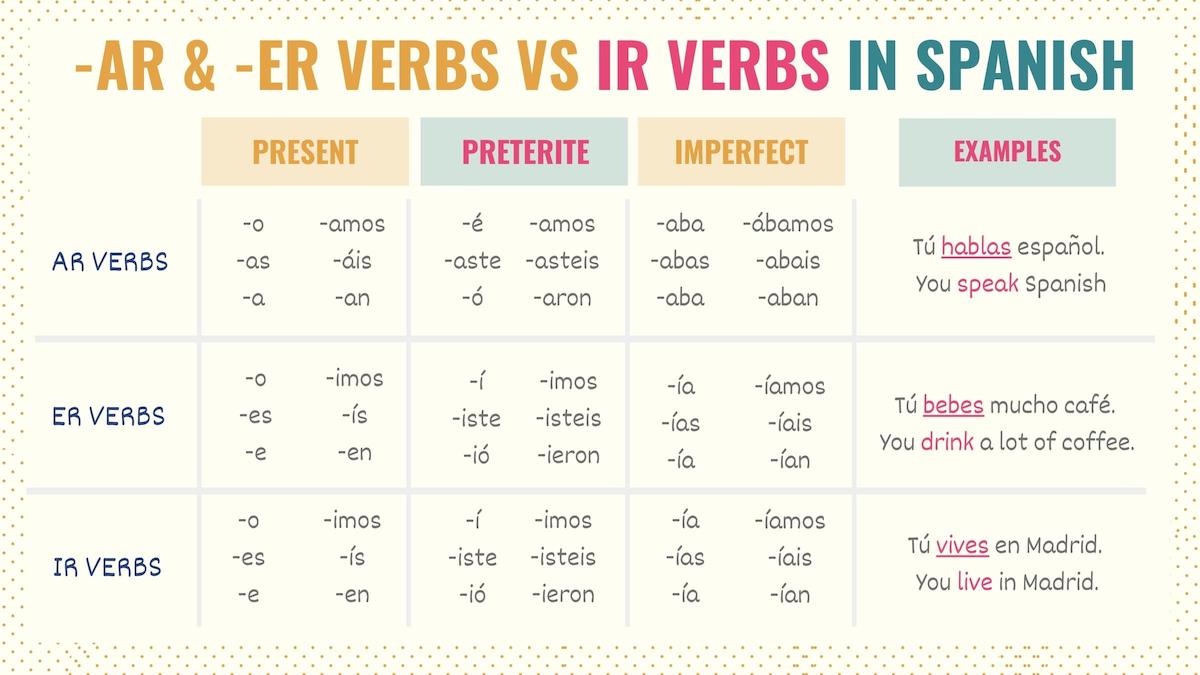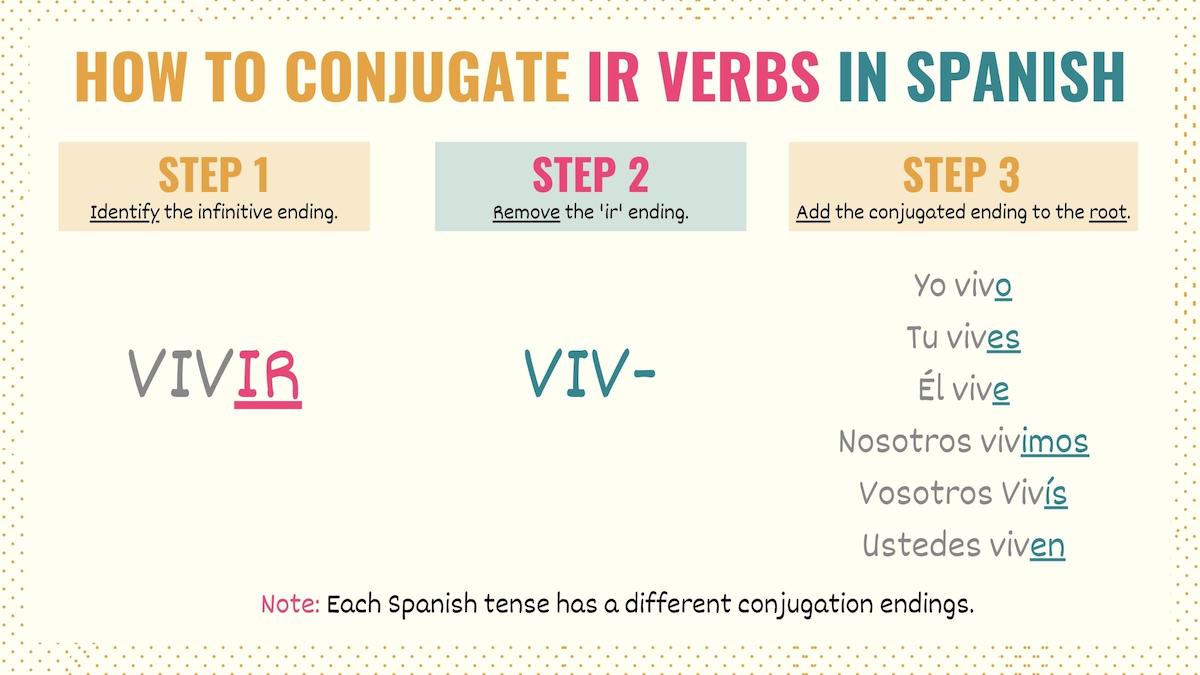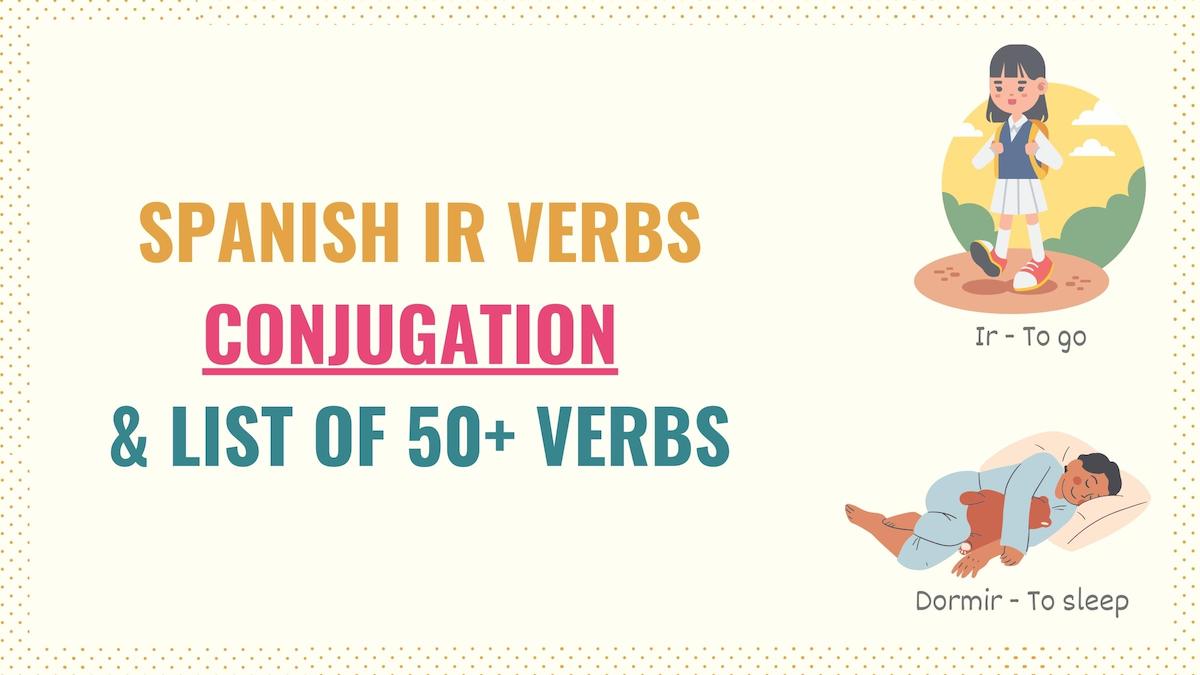When it comes to conjugating verbs in Spanish, verbs ending in ir are the third conjugation type. Although this group is not as large as -ar and -er verbs, they’re still essential for communication. Since getting familiar with the IR verbs in Spanish is crucial, in this guide, you’ll learn:
- What Are Ir Verbs?
- Rules for Conjugating Ir Verbs in Spanish
- Spanish Ir Verbs List
- Additional Spanish Verbs Resources
By the end of this guide, you’ll know how to conjugate ir verbs and learn the most important verbs in this category.
What Are Ir Verbs?

The infinitive ending conditions Spanish verb conjugation. In other words, the type of infinitive determines the endings you must use to conjugate a verb.
So, as its name suggests, Spanish verbs ending in ir are verbs that end in -ir in their infinitive form. For example:
- Abrir: To open
- Salir: To leave
- Vestirse: To get dressed
- Vivir: To live
Check the verbs above. Their ending (-ir) tells you these are infinitive verbs and also reminds you that you must add specific conjugation endings to the stem.
So, the only difference between er, ir and ar verbs is the different conjugation endings you must use for each type of verb.
In the sections below, you’ll learn how to conjugate ir verbs.
Take Note: Although they end with the reflexive pronoun se, pronominal and reflexive verbs still follow the conjugation patterns marked by the infinitive ending. For example, dormirse is a reflexive ir ending verb.
Conjugating Ir Verbs in Spanish: Endings for all Tenses
Regular and stem-changing IR verb conjugations require removing the infinitive ending and adding the corresponding Spanish tense ending to the verb’s root.
Here is a conjugation chart with the endings for the indicative tenses:
| Present | Preterite | Imperfect | Future* | Conditional* | |
|---|---|---|---|---|---|
| Yo | -o | -í | -ía | -é | -ía |
| Tú | -es | -iste | -ías | -ás | -ías |
| Él / Ella / Usted | -e | -ió | -ía | -á | -ía |
| Nosotros | -imos | -imos | -íamos | -emos | -íamos |
| Vosotros | -ís | -isteis | -íais | -éis | -íais |
| Ustedes / Ellos / Ellas | -en | -ieron | -ían | -án | -ían |
Note: To form the future and conditional tense, you only need to add their endings to the non-conjugated verb. Yo viviré.
And these are the endings you’ll need to form the imperative and subjunctive tenses:
| Present | Imperfect | Affirmative Imperative | Negative Imperative | |
|---|---|---|---|---|
| Yo | -a | -iera / -iese | – | – |
| Tú | -as | -ieras / -ieses | -e | -as |
| Él / Ella / Usted | -a | -iera / -iese | -a | -a |
| Nosotros | -amos | -iéramos / -iésemos | – | |
| Vosotros | -áis | -ierais / -ieseis | -áis | -áis |
| Ustedes / Ellos / Ellas | -an | -ieran / -iesen | -an | -áis |
Take Note: Castilian and Latin American Spanish use different verb endings for the imperfect subjunctive. –iese is more prevalent in Spain and -iera in Latin America.
Here are some sentences in different tenses:
Yo vivo aquí.
I live here.
Ella no durmió bien.
She didn’t sleep well.
Tania, ¡abre la puerta!
Tania, open the door!
Te dije que le pidieras ayuda.
I told you to ask her for help.
¿Cuándo abrirás tu regalo?
When will you open your present?
Take Note: Conjugating verbs in Spanish may seem daunting because of all the different endings. But, except for the present indicative, ir and er conjugations share the same verb endings.

50+ Common Spanish Ir Verbs
Here is a list of some of the most common ir verbs we use in daily conversations.
Regular IR verbs in Spanish
A Spanish regular verb has no changes, meaning you only need to add the proper ending to the root. Below is a list of the most common regular IR verbs in Spanish:
- Abrir: To open
- Aburrir: To bore
- Añadir: To add
- Aplaudir: To applaud
- Asistir: To assist / To attend
- Confundir: To confuse
- Cubrir: To cover
- Decidir: To decide
- Describir: To describe
- Descubrir: To discover
- Discutir: To discuss
- Dividir: To divide
- Escribir: To write
- Escupir: To spit
- Existir: To exist
- Hundir: To sink
- Partir: To divide / To leave
- Permitir: To allow
- Pudrir: To rot
- Recibir: To receive/To accept
- Repartir: To distribute
- Reunir: To gather / To collect
- Subir: To go up / To get on / To climb
- Vivir: To live
Sandra escribe muy mal.
Sandra writes very badly.
¿Ya decidieron que quieren hacer?
Did you guys decide what you want to do?
Stem-changing IR Spanish verbs
A stem-changing verb (often conflated with irregular verbs) have minor and documented spelling changes. This is done to keep the verb’s pronunciation consistent. Below is a list of the most common stem-changing -IR verbs in Spanish:
- Conseguir: To get / To achieve
- Convertir: To transform
- Corregir: To correct
- Despedir: To fire
- Dirigir: To run / To manage
- Divertir: To amuse / To have fun
- Dormir: To sleep
- Elegir: To choose
- Freír: To fry
- Herir: To hurt / To wound
- Hervir: To boil
- Medir: To measure
- Mentir: To lie
- Morir: To die
- Pedir: To ask / To order
- Perseguir: To pursue
- Preferir: To prefer
- Recibir: To receive
- Reír: To laugh
- Rendir: To yield / To produce / To tire out
- Repetir: To repeat
- Sentir: To feel
- Seguir: To follow
- Servir: To serve / To purr
- Vestir: To dress
¿Te sientes bien?
Do you feel well?
Juan me pidió ayuda.
Juan asked me for help.
Lilly prefiere ir otro día.
Lilly prefers to go another day.
Take Note: Stem changes vary depending on the verb. Some of these verbs have an O to UE change, whereas others have consonant modifications that only affect ‘yo’. Learn more about this in my guide to stem-changing verbs.
Irregular IR Spanish Verbs
They undergo significant changes in their roots or endings. They can be irregular in one or more tenses. Below is a short list of common irregular -IR verbs:
Yo no le dije nada.
I didn’t say anything to her.
¿A qué hora vendrán?
What time will you guys come?
Mis primos van al cine todos los días.
My cousins go to the movies every day.
Take Note: An irregular verb can be more challenging because it doesn’t have a clear pattern. As a tip, focusing on mastering a tense at a time can make this process much easier.
Next Steps: Spanish Verb & Conjugation Resources
Now that you know what an ir verb is, here are your next steps to improve your command of this topic. A good amount of these verbs have stem changes. Therefore, one of your first steps should be understanding conjugation rules for stem-changing verbs in Spanish.
As mentioned before, this is the smallest conjugation group in Spanish. So, check how to conjugate -AR verbs and the endings for -ER verbs. If you’re looking to improve your vocabulary, I’ve compiled a list of the most useful and basic verbs in Spanish.
Finally, take the time to practice these verbs. You start adding them into your conversations, write sentences or check their patterns. In the “List of Ir Verbs” section, each verb is linked to a conjugation guide so you can study them as well as a conjugations practice quiz to cement your new knowledge! ¡Buena suerte!
Download the Regular & Irregular IR Spanish Verbs PDF
While Spanish IR verbs aren’t as common as AR or ER verbs, there are still plenty of common verbs in this category you must learn. Now that you’ve gone though this guide, you can download a free copy of the PDF cheat sheets which includes the list of regular, irregular and stem-changing verbs. It also includes the -IR conjugation tables.



